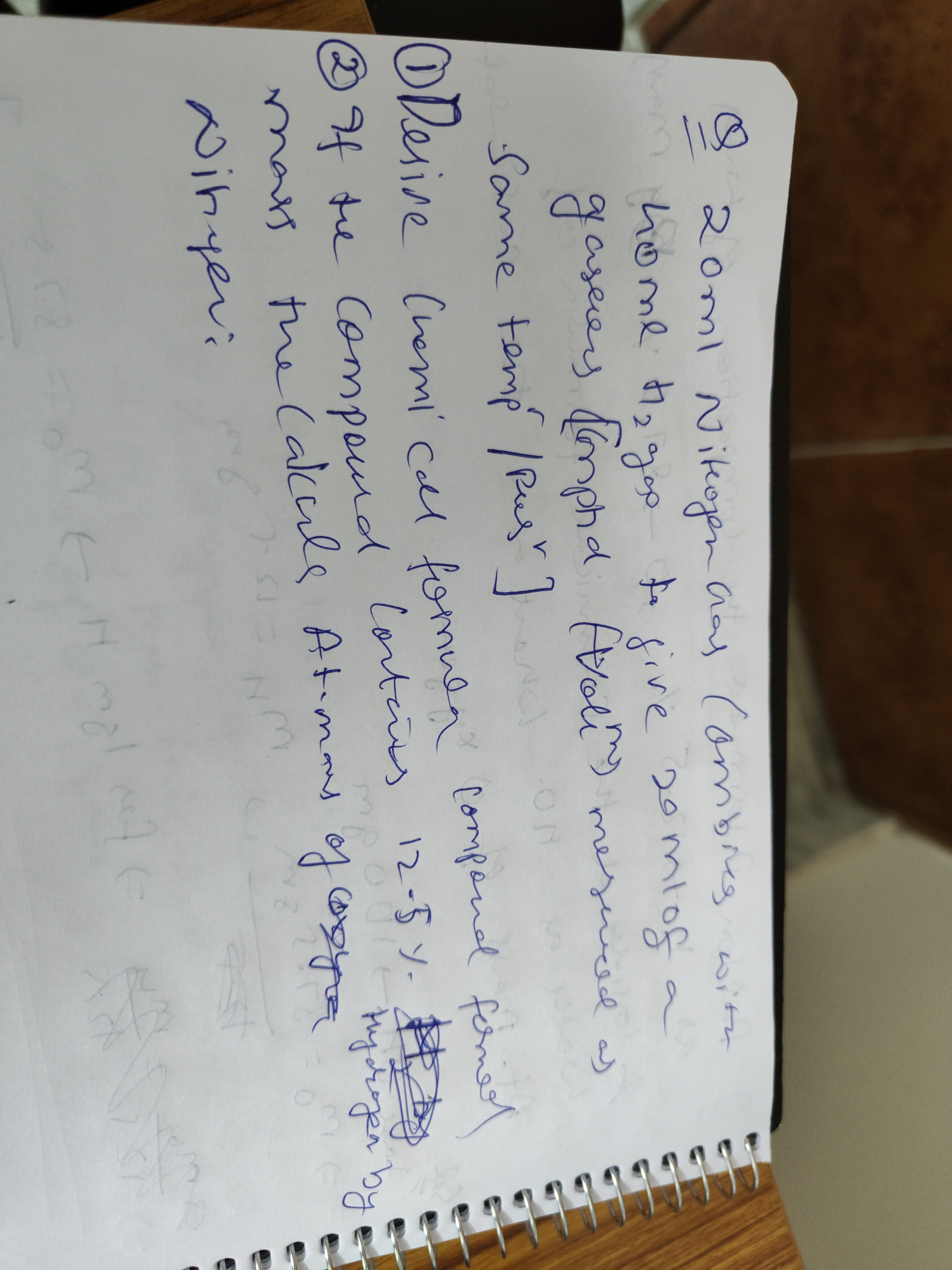Question
Question: $20ml Nitrogen Gas Combines with home $H_2$ go to give $20ml$ of a gaserers Compted [Volim mesured a...
20mlNitrogenGasCombineswithhomeH_2gotogive20mlofagaserersCompted[VolimmesuredasSametemp/Pus]①DesiveChemicalformulacompendformel②IfthecompoundContains12.5massthe(akuleAtimansofO_2$ Nitiyer:

- Chemical formula of the compound: N₂H₄
- Atomic mass of Nitrogen: 14
Solution
Part 1: Derive the Chemical Formula of the Compound
-
Application of Gay-Lussac's Law of Gaseous Volumes and Avogadro's Law:
The problem states that 20 ml of Nitrogen gas (N₂) combines to give 20 ml of a gaseous compound, with volumes measured at the same temperature and pressure.
According to Gay-Lussac's Law, when gases react, they do so in volumes that bear a simple whole-number ratio to one another, and to the volumes of the gaseous products, provided all volumes are measured at the same temperature and pressure.
According to Avogadro's Law, equal volumes of all gases, at the same temperature and pressure, contain the same number of molecules (or moles).
The given volume ratio of N₂ reacted to the compound formed is 20 ml : 20 ml, which simplifies to 1 : 1.
This implies that 1 molecule of N₂ reacts to produce 1 molecule of the compound.
-
Determine Nitrogen Content in the Compound:
Since 1 molecule of N₂ (which contains 2 nitrogen atoms) forms 1 molecule of the compound, and atoms are conserved in a chemical reaction, the compound must contain 2 nitrogen atoms.
Therefore, the chemical formula of the compound can be represented as N₂Hₓ, where 'x' is the number of hydrogen atoms.
Part 2: Calculate the Atomic Mass of Nitrogen
-
Use Mass Percentage Information:
The compound contains 12.5% Hydrogen by mass.
This means the remaining percentage is Nitrogen: 100% - 12.5% = 87.5% Nitrogen by mass.
-
Set up Mass Ratio based on Percentage Composition:
Let the atomic mass of Nitrogen be Natm and the atomic mass of Hydrogen be Hatm. We use the standard atomic mass of Hydrogen, Hatm≈1g/mol.
In the compound N2Hx:
Mass of Hydrogen in one molecule = x⋅Hatm=x⋅1=x
Mass of Nitrogen in one molecule = 2⋅Natm
The ratio of the mass of Hydrogen to the mass of Nitrogen in the compound is equal to the ratio of their mass percentages:
Mass of NMass of H=Percentage of NPercentage of H 2×Natmx=87.512.5 -
Simplify the Ratio:
87.512.5=875125=71So,
2×Natmx=71 7x=2×Natm(Equation 1) -
Incorporate Molecular Mass (Assumed from Context):
The problem does not explicitly provide the molecular mass of the compound. However, similar problems (like the one provided for context) often specify this. Assuming the molecular mass of the compound N₂Hₓ is 32 g/mol (a common value for compounds of nitrogen and hydrogen with this percentage composition, e.g., Hydrazine):
Molar mass of N₂Hₓ = (2×Natm)+(x×Hatm)=32
2×Natm+x=32(Equation 2) -
Solve the System of Equations:
Substitute the expression for (2×Natm) from Equation 1 into Equation 2:
7x+x=32 8x=32 x=4 -
Calculate the Atomic Mass of Nitrogen:
Substitute the value of x = 4 back into Equation 1:
7×4=2×Natm 28=2×Natm Natm=14
Conclusion:
- Chemical Formula of the Compound: Based on the volume ratio and conservation of atoms, the compound contains 2 nitrogen atoms. With x=4, the formula is N₂H₄.
- Atomic Mass of Nitrogen: The calculated atomic mass of Nitrogen is 14.
The compound formed is Hydrazine (N₂H₄).
The final answer is N₂H₄, Atomic mass of N = 14
Explanation of the solution:
- Volume Ratio to Molecular Ratio: Given 20ml N₂ reacts to form 20ml product at same T,P. By Avogadro's Law, this 1:1 volume ratio implies 1 molecule of N₂ forms 1 molecule of the compound.
- Nitrogen in Compound: Since N₂ has 2 nitrogen atoms, the compound must also have 2 nitrogen atoms. Formula is N₂Hₓ.
- Mass Percentage to Molar Ratio: Given 12.5% H, so 87.5% N. Assuming H atomic mass = 1, the ratio of moles of H to N is (12.5/1) : (87.5/N_atm) = x : 2. This leads to the relationship 7x=2×Natm.
- Molecular Mass Assumption: Assuming the molecular mass of the compound is 32 (a common value for N₂H₄ and necessary to solve the problem), we have 2×Natm+x=32.
- Solving System: Solving the two equations (7x=2×Natm and 2×Natm+x=32) yields x=4 and Natm=14.
- Final Formula and Atomic Mass: The chemical formula is N₂H₄ (Hydrazine), and the atomic mass of Nitrogen is 14.
